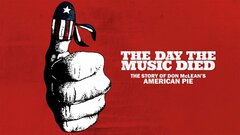Singer-songwriter Don McLean earned an enduring No. 1 hit with the unlikeliest of tunes: a plaintive, epic-length ballad about the end of America's innocence, spelled out in highly, often impenetrably poetic lyrics. Despite this, "American Pie" became one of the great pop songs of the 20th century, as well as the defining recording of McLean's career. He emerged from the New York folk scene in the late 1960s, drawing influence from such legends as Pete Seeger and the Weavers.
"American Pie" immediately elevated him from obscurity to superstardom, but McLean would find it difficult to find chart success in its wake, largely due to his own reticence to repeat the song's formula. Both he and "American Pie" remained perennial favorites on radio and in concert, where he worked through the song for new generations of listeners raised on their parents' LPs.
Born Donald McLean on Oct. 2, 1945 in New Rochelle, NY, he suffered from asthma as a child, which required him to miss lengthy periods of school. During his recuperation, he discovered folk music through the Weavers' At Carnegie Hall (1955) album, which inspired him to take music lessons. By his teenaged years, McLean had recorded his first sessions with Greenwich Village folk veteran Lisa Kindred.
He then briefly attended Villanova University, where he befriended fellow student and future folk star Jim Croce, before signing with agent Harold Leventhal, who had managed Woody Guthrie and Joan Baez, among others. Leventhal booked McLean at a variety of notable clubs, including the Bitter End and Gaslight Café in New York, as well as Los Angeles' Troubadour and a slot at the Newport Folk Festival.
A 1968 grant from the New York State Council on the Arts allowed him to reach a wider audience, as did a partnership with Pete Seeger, who took McLean along with him on a 1969 trip up the Hudson River on his boat, the Clearwater, to raise awareness about environmental pollution. During this period, McLean wrote most of the material that would appear on his debut album, Tapestry (1969). Countless labels rejected the songs before he received a contract from Mediarts, a small label owned by Capitol Records executive Alan W. Livingston and producer Nik Venet.
Tapestry would earn solid critical reviews but sell few copies, though one single, "And I Love You So," would become a hit for Perry Como as well as a concert and record staple for Elvis Presley, Glen Campbell, Harry Connick, Jr. and countless other artists.
However, McLean's fortunes changed dramatically when United Artists purchased Mediarts, which provided his second album, American Pie (1971), with the promotional support of a major label. The record generated a modest hit in the elegiac "Vincent," which paid tribute to painter Vincent Van Gogh, but its epic title track became the song by which McLean would be identified for the rest of his career.
Clocking at over eight minutes in length, the song appeared to intimate that the 1959 deaths of Buddy Holly, Ritchie Valens and The Big Bopper marked the beginning of America's moral and cultural decline, though McLean's impressionistic lyrics invited a number of interpretations, most of which the singer refused to acknowledge. Despite its running time, the plaintive "American Pie" struck a chord with American listeners, who had emerged from the tumultuous 1960s into the confusion of the 1970s.
It shot to No. 1 in 1972 and remained in the top spot for four weeks, minting McLean as a leading figure in the burgeoning singer-songwriter movement. He also served as the inspiration for the hit single "Killing Me Softly With His Song," which songwriters Norman Gimbel and Charles Fox adapted from a poem by singer Lori Lieberman based on her experience of seeing McLean in concert.
However, subsequent releases failed to reproduce the runaway success of "American Pie," due in part to McLean's refusal to deliver another song of that scope or even sound. There were occasional minor hits, like the Top 30 "Dreidel" and "If We Try," and a final visit to the top of the Easy Listening charts with 1975's "Wonderful Baby," but by 1976, United Artists had dropped his contract.
McLean then signed with Arista for Prime Time, but its failure, as well as disagreements with label chief Clive Davis, left him without a label the following year. Arista agreed to release Chain Lightning (1980), his second of four intended records for the imprint, in Europe and Australia, where it generated a No. 1 single with his cover of Roy Orbison's "Crying." The international success prompted Millennium Records to release the record in the United States, where it rose to No. 28 on the albums chart, while "Crying" shot to No. 5 on the pop singles chart in 1981.
However, the failure of follow-up records once again left McLean without a label by 1983.
McLean spent much of the late '80s and 1990s touring the world while releasing vintage material and newer songs on a wide array of labels, including his own, Don McLean music. The influence of "American Pie" upon popular music and culture, however, never lost its impact, as evidenced by high-profile renditions at a free concert with Garth Brooks in New York's Central Park in 1997 and the Lincoln Memorial Gala in Washington, D.C. in 2000.
Madonna generated a No. 1 hit with a truncated version of "American Pie" that same year before McLean's version received the ultimate laurel in 2001 when the Recording Industry Association of American and the National Endowment for the Arts placed it at No. 5 on its list of "Songs of the Century," preceded only by "Over the Rainbow," "White Christmas," "This Land is Your Land" and Otis Redding's "Respect."
The song was subsequently inducted into the Grammy Hall of Fame in 2002, two years before McLean himself would become a member of the Songwriters Hall of Fame. McLean would also perform the song at the celebration for President Barack Obama's inauguration in 2009. By Paul Gaita





























